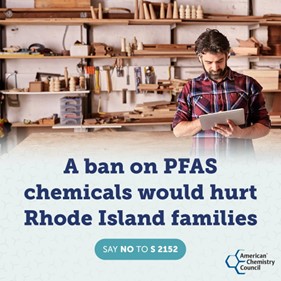
Proposed legislation in Rhode Island, SB 2152, threatens to ban a class of chemistries critical for state industries and could create major disruptions for families and businesses in state.
The bill in question, The Comprehensive PFAS Ban Act of 2024, would prohibit the use of intentionally added PFAS chemistries in various products beginning January 1, 2027, which would specifically impact such consumer items as carpets, cookware, cosmetics, apparel, and textiles, among other items. The stated legislative intent of the bill is to eliminate entirely all existing products with intentionally added PFAS by 2032, with PFAS defined as a chemical containing one fully fluorinated carbon.
One major issue with the bill is that its proposed ban of all PFAS substances would include a particular category of fluorinated chemistries known as fluoropolymers, which are critical for many industries, including semiconductors, renewable energy, healthcare equipment, pharmaceuticals, aerospace, automobiles, and agriculture. Fluoropolymer chemistries also support many products that are essential for health, safety, or the functioning of society, and for many of which there may be no viable alternatives.
The fact is that fluoropolymers are essential to modern life, contributing to the strength, durability, and stability of a whole slew of products including solar panels, lithium-ion batteries, life-saving medical devices, and semiconductors.
But don’t take our word for it.
The U.S. Department of Defense has said that losing access to PFAS, including fluoropolymers, “would greatly impact national security,” and it highlights the essential uses of fluoropolymers in a wide variety of critical applications: “Dozens of different fluoropolymers (e.g., PVDF, ECTFE, PTFE) and fluoroelastomers (e.g., FKM/FFKM) are critical to modern UV-resistant, ozone-resistant, weather-resistant, temperature-resistant, high pressure-resistant, chemical-resistant “rubberized” fuel lines. They are also key materials in hoses, tubing, hydraulic system lines, O-rings, seals and gaskets, tapes, and cables and connectors widely used in civil and military aircraft, space systems, vehicles, weapon systems, utility systems, and other applications. Alternatives are not as resistant to embrittlement and break-down and have a much shorter useful life, leading to more frequent part replacement, which is not feasible for space or satellite uses.”
In addition, the Semiconductor PFAS Consortium, an international group of semiconductor industry stakeholders, stated that “Fluoropolymers are a subclass of PFAS that possess a unique set of characteristics … including inertness, purity, low flammability, temperature stability, resistance to chemical permeation, low coefficient of friction, optical properties, mechanical properties, contamination control, electrical properties, processability, resistance to bacterial growth, and long service life (>25 years). [T]he use of fluoropolymers is often required by safety and insurance guidelines. To maintain the cleanroom and assembly test purity requirements, fluoropolymers are also needed to prevent particle generation, which is detrimental to semiconductor production yield.”

The reality is that the majority of attention on PFAS has focused not on fluoropolymers but rather on a handful of substances that are no longer produced by leading global manufacturers in the US, EU, Japan, or India. Fluoropolymers in commerce today have been reviewed by regulators before introduction, are subject to ongoing review, and are supported by a robust body of health and safety data.
Rhode Island lawmakers should work with industry stakeholders on practical, science-based legislation that recognizes the critical applications that rely on fluoropolymer chemistries in order to avoid potentially severe consequences to the state’s residents.
For more information, contact Erich_Shea@americanchemistry.com.
